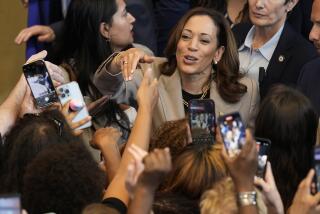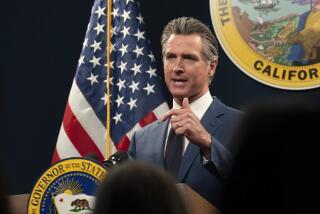White House Calls Byrd Plan ‘Price Tag Politics’
WASHINGTON — The White House Tuesday denounced a new alternative Democratic plan for expanding the drug war by $4 billion as “price tag politics” and threatened a presidential veto if Congress approves it.
The alternative, sponsored by Sen. Robert C. Byrd (D-W.Va.) and backed by other key Democratic leaders, would cut all defense and domestic appropriations by 0.575% to produce the additional funds required for next year’s anti-drug programs.
Meanwhile, William J. Bennett, director of the White House Office of National Drug Control Policy, told a congressional panel that the $7.86 billion the President had requested for fiscal 1990 was only the first step in an anti-drug campaign he estimated could cost $50 billion over the next five years.
This estimate was the Administration’s first firm assessment of the long-range cost of the drug plan and appeared designed to reassure skeptics who contend that Bush’s program does not provide enough funds.
Transportation Bill
Byrd, chairman of the Senate Appropriations Committee, offered his plan as an amendment to a transportation appropriations bill, but it would affect all 13 appropriations bills pending before Congress for the year starting Oct. 1.
Although Senate Minority Leader Bob Dole (R-Kan.) at first indicated that GOP lawmakers could support Byrd’s approach, he later declared that it is too costly and would trigger a veto by President Bush in its present form.
Top Administration officials--including Bennett, White House Chief of Staff John H. Sununu and Defense Secretary Dick Cheney--met with Dole at his Capitol office to consider how to deal with Byrd’s surprising initiative.
Bush had proposed a $2.2-billion increase in funding for drug programs over present levels, with 70% of the money earmarked for law enforcement and 30% for treatment and education.
Byrd told reporters that he is puzzled by the Administration’s strong criticism of his proposal and indicated that he would refuse to modify it to meet Republican objections.
“It’s not a political amendment,” Byrd said, noting that many critics believe that Bush did not go far enough with his drug battle plan. “Let the American people speak--let’s read their lips for once.”
His argument was echoed by state and local officials testifying before the Senate Judiciary Committee Tuesday.
Local Loss Feared
Mayor Joseph P. Riley of Charleston, S.C., said that “almost everyone acknowledges” that the $350 million Bush slated in federal aid to state and local law enforcement is too little. He added that state and local governments might be facing a net loss from the program.
Sen. Joseph R. Biden Jr. (D-Del.) noted that the Bush plan requires state and local governments to give drug tests to all prisoners--tests that alone would cost $244 million of the $350 million being offered.
Byrd’s move came after substantial Democratic criticism that the President’s drug plan is inadequate and that it does not allocate enough money to deal with the nation’s leading domestic problem.
Because Bush has indicated that he opposes any tax increases to pay for additional costs of fighting the drug menace, Byrd said, he came up with his proposal for an across-the-board cut in all discretionary domestic, defense and international programs to pay the bill.
“It’s fair, it’s comprehensive and it’s now,” Byrd said, noting that Congress would have to act promptly on appropriations bills anyway.
Bush had proposed to pay for another $716 million in new drug programs in part by cutting $194 million from funds previously allocated for economic development, public housing, health and human services, juvenile justice programs and a Pentagon communications system. Reacting to the Byrd plan, White House Press Secretary Marlin Fitzwater responded with partisan vitriol against the Democrats.
Noting that Congress required the adoption of a national drug strategy in the 1989 drug act, Fitzwater said:
“How ironic that, when the strategy was completed, and in spite of its wide acceptance, the Democrats moved within hours to play price tag politics with the plan.
“Their first answer was to tax more. Then they had a daylong conference to decide why they can’t win a presidential election. And now their new answer is to spend more. Tax more and spend more is the traditional Democratic formula, but we believe it is time for both parties to put aside political wrangling.”
Specifically aiming at Byrd’s proposal, the President’s spokesman said that it would “throw money at the problem” and cut $1.8 billion from Pentagon spending on an arbitrary basis.
Later, however, another White House official said that the President might support a drug funding plan advanced by Sen. Ernest F. Hollings (D-S.C.) that would make a smaller across-the-board cut in State Department and Justice Department spending to raise $1.8 billion for drug programs.
Appropriations Panel
Byrd said that he would seek to get the approval of the Senate Appropriations Committee today for his funding proposal and that he hopes to get backing from the entire Senate when it votes on the money bill for the Transportation Department.
In a related development, a Senate Appropriations subcommittee on defense approved a $279.7-billion spending bill for next year that contained $1.05 billion for drug programs--or eight times the $132 million Bush had requested.
The total includes a transfer of $300 million in cash and equipment for the Coast Guard, $118 million for Pentagon drug treatment and education programs and $60 million for surveillance planes and ships.
Staff writers Douglas Jehl and James Gerstenzang in Washington contributed to this report.
More to Read
Get the L.A. Times Politics newsletter
Deeply reported insights into legislation, politics and policy from Sacramento, Washington and beyond. In your inbox three times per week.
You may occasionally receive promotional content from the Los Angeles Times.










